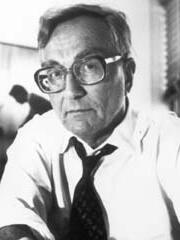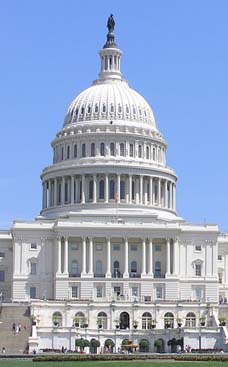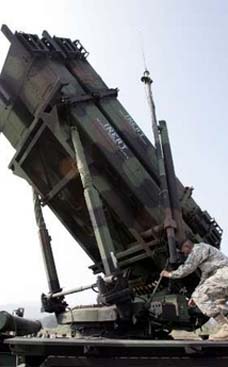
MATTHEWS: I just wonder will the same pressures that took us into regime change with Iraq, with all the questions that were still out there, we‘ll do it again. Hard to say, or what?
HERSH: Well, nobody can tell. I mean, it‘s ridiculous to predict the future. But—it is, you just can‘t do it. But you can do one thing. You can say one thing. There is a pattern emerging which is really scary. Again, in this article, I write the CIA has done an assessment that doesn‘t say about Iran‘s intentions. They may have dreams about a bomb. What the CIA says is we‘ve looked hard, we can‘t find any evidence of a significant weapons program. But they also say—the CIA also says, what‘s the rush? They also suggest that if you do go to war with Iran now, you‘re going to be kicking off the can into something very, very big that you don‘t really understand. You could drive Sunnis and Shia together into another caliphate.
Chris Matthews interviews Seymour Hersh: Who's pushing for another war in the Middle East?
'Hardball with Chris Matthews' for Nov. 20
Updated: 9:30 a.m. CT Nov 21, 2006
Guests: Seymour Hersh, Ed Rogers, Steve McMahon, Terry Jeffrey
[Excerpt]
CHRIS MATTHEWS, MSNBC ANCHOR: Do hawks still fly?
Is Vice President Cheney‘s office, which sold us the war in Iraq, now planning to push for war with Iran?
Story continues below ↓ advertisement
Let‘s hear from investigative reporter Seymour Hersh.
Let‘s play HARDBALL.
Good evening. I‘m Chris Matthews, and welcome to HARDBALL.
Are we getting any closer to ending this war in Iraq?
While Congressional Democrats sit back and wait for James Baker to recommend a course of action, the “Washington Post” reports today that the Pentagon is working on a plan for more U.S. troops in Iraq. Will Congressional Democrats stand for it, or will they buck their responsibility to challenge the war? More on that later.
We begin with the “New Yorkers‘s” investigative reporter Seymour Hersh and his big piece about the push inside the vice president‘s office for an attack on Iran.
I know you‘ve got a lot in this big piece. Sy, first question: who‘s pushing for an attack, if the disaster, or the catastrophe, of this war with Iraq, who‘s pushing for another war in the Middle East?
SEYMOUR HERSH, “THE NEW YORKER”: Well, Cheney‘s the leader, obviously. He—I wouldn‘t say he‘s pushing for another war. What I would say is that his office has been sort of a point—the point for continuing to look very hard at Iran, and thinking one solution to resolving your problems inside Iraq is to do something about Iran, to get them to stop meddling.
MATTHEWS: Let‘s not jump over that. Who is David Wurmser, and what does he want? He works for the vice president. Describe his role here?
HERSH: He‘s assistant to the vice president. But he‘s sort of their main guy on issues about Iran. He‘s out of the American Enterprise Institute. He‘s a very bright, very nice guy. He worked with Richard Perle back in those days. I guess you‘d call him a classic neoconservative.
MATTHEWS: He was pushing the war in Iraq, regime change against Saddam Hussein. I mean the project for the new American century, the clean break recommendation to beat Netanyahu. He‘s been on this trail for a long time of aggressive action by us in the Middle East.
HERSH: Yes, absolutely, for ten years.
MATTHEWS: And is he now pushing within the vice president‘s office for the vice president to endorse an attack?
HERSH: Well, there‘s a lot of people who believe that the Israelis are basically right, and when they say this is an existential threat that we must deal with, with Iran, we cannot let Iran have a nuclear weapon. And the question is, will George Bush leave office without doing something about Iran? Whether he can get them—he‘s not going to get them to talk, not at the way he‘s going. The price is too high, there‘s no reason—in this article, I make the point that, why should Iran talk to us? Well, you know...
MATTHEWS: Well, you‘re not the only one—if it is David Wurmser, you‘re certainly not the only American pushing for an attack on Iraq‘s nuclear facilities. But I think he might be one, according to your article, who recognizes the dimensions of that attack.
You can‘t just surgically attack. You‘ve got to go after their triple A, you‘ve got to go after all the defensive capability, and you have to recognize that they could well respond with an all-out declaration of war against us and take all kinds of steps against the oil lanes and everything else.
Do they know that in the vice president‘s office, that war means war?
HERSH: They think that—you know, what the Air Force would call a thousand points of light. There‘s a lot of targets in there that you have light up. But they think they can handle it. There‘s been a lot of very good studies done. I should say the military‘s—they think they can suppress the Iranian missiles, there‘s a lot of classified stuff that they‘ve looked at. We‘ve done a lot of—we have a lot of technical intelligence we‘ve collected on Iran. We know where everything moves there. We have people inside, the Israelis have people inside. We‘re not dark about it. We have a lot of insight.
MATTHEWS: OK.
Now the vice president has been overruled in his attempt to try to keep Rumsfeld and in his attempt to prevent Gates from coming in. That‘s a fair assessment, isn‘t it? He‘s been overruled?
HERSH: He was pretty much—I think—the reading I get, and I write about this, too—is he was pretty much—he went along.
MATTHEWS: He went along. Was he overruled?
HERSH: I don‘t know. I don‘t know. Does anybody really know what goes on between Bush...
MATTHEWS: The reason I asked that is about the future, not what happened here. But is the vice president still strong enough with the president that he could push with an attack on Iran before the two of them leave office?
HERSH: Scowcroft, Baker and 41, the old president, there‘s no question that the Gates move was orchestrated, in part, to neutralize Cheney. This is something I did write about.
MATTHEWS: It‘s in the article.
HERSH: The goal is to figure out some way to stop—Cheney‘s very powerful. He‘s very, very bright. He‘s very competent. He runs everything. He knows everything. The president, as much as I can tell from talking to the few people that I talked to around him, the president defers often on such...
MATTHEWS: Well, you don‘t defer the question of whether to attack Iran or not. He‘s going to have to—the question is, you‘ve got some neoconservatives, people like Robert Kagan, who have openly written columns within the last couple of months, saying this president, to fulfill his doctrine, has to attack Iran before he leaves office and get rid of those nuclear capabilities, or else he will have failed his presidency. They‘re very stark about it.
And in your piece, you talk about Wurmser having something of that view. I just wonder will the same pressures that took us into regime change with Iraq, with all the questions that were still out there, we‘ll do it again. Hard to say, or what?
HERSH: Well, nobody can tell. I mean, it‘s ridiculous to predict the future. But—it is, you just can‘t do it. But you can do one thing. You can say one thing. There is a pattern emerging which is really scary. Again, in this article, I write the CIA has done an assessment that doesn‘t say about Iran‘s intentions. They may have dreams about a bomb. What the CIA says is we‘ve looked hard, we can‘t find any evidence of a significant weapons program.
But they also say—the CIA also says, what‘s the rush? They also suggest that if you do go to war with Iran now, you‘re going to be kicking off the can into something very, very big that you don‘t really understand. You could drive Sunnis and Shia together into another caliphate. This is in the report.
MATTHEWS: Sure.
HERSH: Meanwhile, the CIA...
MATTHEWS: Unite the—certainly unite the Iranians against us. The new breed secular, pro-Western crowd will hate us for this.
HERSH: Why not?
And also drive the price of oil up for here, too.
MATTHEWS: By the way, I‘ve always wondered the limits of nuclear—of military power. You could blow up whatever facility you thought they had. And they‘d rebuild. We bombed strategically against Germany and they kept rebuilding underground. They just proliferated even further. They were building and building right until the end of the war. What stops Iran, it‘s a modern country, from just rebuilding whatever we blow up?
HERSH: Well, not only that. Despite the fact that I say we know everything we think we know, it‘s a country that has been digging holes for a thousand centuries, you know.
MATTHEWS: And they have duplicate facilities, right?
HERSH: Well, you just don‘t know. The CIA says no. But here‘s what makes it interesting. The White House hated that intelligence, did not like it, sort of kicked it out.
MATTHEWS: Who‘s the White House?
HERSH: Cheney‘s office, basically.
MATTHEWS: You know, Pat Moynihan would never take a letter from the White House. He said, that‘s a building, who‘s sending me the letter? Well, who is Dick Cheney? David Addington?
HERSH: No. No.
MATTHEWS: Is it Wurmser?
HERSH: Elliott Abrams would certainly be involved, although he‘s not directly in the office. He‘d certainly be involved, because he‘s very powerful.
MATTHEWS: So the gang‘s still here?
HERSH: Oh, my god. You know what‘s amazing about this gang?
MATTHEWS: The gang that got us into the war with Iraq, the intellectual people around the president and vice president who thought it was, you know, just gang busters‘s idea to go to Iraq. They‘re still there calling the shots on Iran?
HERSH: What‘s amazing about it is that, when you think about it, the intellectual leaders, Wolfowitz, Libby, Douglas Feith.
(CROSSTALK)
MATTHEWS: Libby‘s busy. Doug‘s trying to get a table in the Georgetown Faculty Club for lunch.
But what‘s his name? Libby‘s busy, as I said, and Wolfie‘s off doing the McNamara business of saving the world again.
HERSH: And Perle‘s no longer the defense policy voice. And yet...
MATTHEWS: Perle‘s out there complaining. But so is Ken (ph).
(CROSSTALK)
HERSH: I‘ve never felt more sympathy for Rumsfeld than to listen to Adelman complain about how tough Rumsfeld was in their meetings. I‘ve never had—my heart went out to Rumsfeld.
MATTHEWS: This has got to be a play someday. This is Broadway, these guys.
HERSH: No, this is slapstick. It‘s strictly slapstick.
MATTHEWS: It‘s a piece of work, these guys.
HERSH: But here‘s the point I want to make. With these powerful leaders, Wolfowitz, Perle, et cetera, the neocons are still dominant. It‘s amazing. They‘ve sort of seated themselves.
MATTHEWS: OK. Your writing has once again elicited a response from the White House. And I have to read this, because it‘s appropriate. Here‘s the White House response to what Sy Hersh wrote today in “The New Yorker”.
“Sy Hersh”—Seymour Hersh, they call him -- “is unfortunately continuing his series of inaccuracy-riddled articles about the Bush Administration with another error-filled piece about the Administration‘s policy toward Iran. The White House is not going to dignify the work of an author who has viciously degraded our troops”—I want you to respond to that part—“and whose articles consistently rely on outright falsehoods to justify his own radical views.”
HERSH: What about the story? That‘s all...
MATTHEWS: What about—have you viciously attacked...
(CROSSTALK)
HERSH: No, what happened is a couple of weeks ago, I gave a speech in Montreal at McGill University and the editor picked a line out at random. What I do—and let me tell you something...
MATTHEWS: What did you say?
HERSH: I said there‘s been never a war as violent and murderous as this one. There really—and that‘s true. It‘s a very violent war. But the point I‘ve always made in forty years of reporting: responsibility always goes to the top. And the kids who do the shooting are as much victims—in the next speech I did...
MATTHEWS: Do you believe honestly, when you gave that speech, that you were talking about the commander-in-chief and his civilian leaders at the Pentagon?
HERSH: That‘s what the speech said. It was just a line taken at random that was put out as a headline. And that‘s what the White House went...
MATTHEWS: To make it look like you‘re anti-soldier.
HERSH: It happened right after the day—this all blew up after John Kerry‘s thing. It was right before the election and everybody was grabbing every story. You know, the White House can read exit polls, too. They knew...
MATTHEWS: Can I give you some advice? When you‘re critical of our military—not of our military, but of our military establishment, of our president, do it here. The problem with doing it overseas is people don‘t like the sound of it.
HERSH: You know, that‘s so interesting. It‘s a speech I‘ve made. I was critical of the policy. And it was a speech I‘ve made everything, because of that byte having to come in Canada—I‘ve made that speech for two years, the same line. You‘re right. I got an amazing amount of criticism—what kind of a coward he is go to Canada and give this speech?
MATTHEWS: Because George McGovern did it right after losing the race to Nixon. He went over an trashed American policy in Vietnam and everybody thought he was a skunk for doing it.
HERSH: Well, you know, it‘s an interesting point, because—for me, I would say—I didn‘t trash the troops.
MATTHEWS: Save it for home.
HERSH: No, it‘s not that. You can be critical. We‘re a big country.
We can take a little criticism.
MATTHEWS: But it‘s easy to turn your words against you overseas.
HERSH: I once said in Canada—in Toronto, I said we‘ve got to understand out enemy, not just hate them. Understand them, figure out what we‘re up against. That was turned into the soft-line. I thought it was the hardline. I think being smart‘s the hardline.
Anyway, Hersh, you‘re unbelievable. You got them roused up again.
HERSH: That‘s my job.
MATTHEWS: It‘s my job to try to figure out what you know and really can figure out and what might not be true, because I do want to know what Wurmser‘s up to.
Anyway, thank you, Sy, in the vice president‘s office.

















